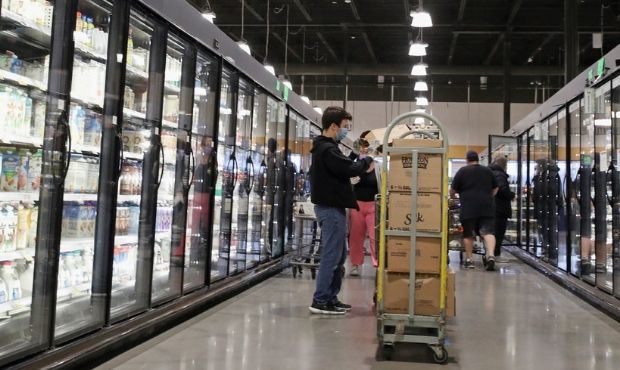Seattle City Council approves $4 more per hour for grocery workers
Jan 25, 2021, 5:33 PM | Updated: 5:45 pm

Workers at a ShopRite supermarket stock shelves on April 24, 2020 in Plainview, New York. (File photo by Bruce Bennett/Getty Images)
(File photo by Bruce Bennett/Getty Images)
Seattle’s City Council voted on Monday to require large grocery stores and chains to pay workers $4 more per hour during the COVID-19 pandemic, effective immediately.
Councilmember Teresa Mosqueda, chair of the Finance and Housing Committee, says a survey of grocery workers in Boston found 20% of them had tested positive for COVID-19, despite high mask usage. She says grocery employees are essential workers, and their employers are not suffering financially because of the pandemic.
Ballard restaurant owner: Thankfully surviving due to ‘very loyal customers’
“Grocery store workers have been on the frontlines of this pandemic, interacting with many customers each day in hazardous conditions to ensure Seattle residents can put food on the table,” Mosqueda said on Friday while introducing the . “Grocery workers are also experiencing extreme hardships during the COVID economic downfall, losing housing, childcare and more. It’s also not lost on me that the dangers of working in grocery stores during the pandemic are felt especially by our BIPOC communities, as employees of color are overrepresented in the retail frontline workforce and those communities are disproportionately impacted by COVID-19.”
Seattle council members say they plan to keep the law in place for at least four months. All grocery employees are expected to be eligible for the vaccine by April 2021 (four months away), per the Washington State Department of Health’s vaccination plan.
Before the vote on Monday, the Washington Food Industry Association president said the grocery industry feels singled out by the legislation, which will hurt their ability to compete with online-only sites.
The legislation does not impact convenience stores or food marts selling a limited line of goods.
According to a , several other U.S. cities have announced legislative efforts to require hazard pay for grocery store workers, with more expected to follow suit.














